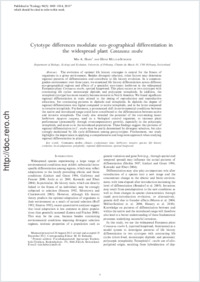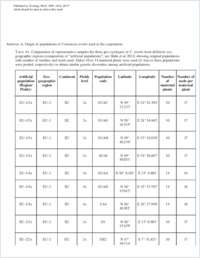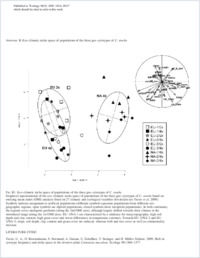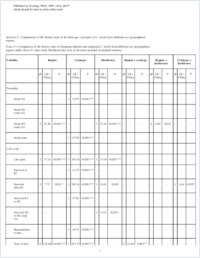Cytotype differences modulate eco-geographical differentiation in the widespread plant Centaurea stoebe
- Hahn, Min A. Department of Biology, Ecology and Evolution, University of Fribourg, Switzerland - Forschungsanstalt Agroscope Reckenholz-Tänikon, Zürich, Switzerland
- Müller-Schärer, Heinz Department of Biology, Ecology and Evolution, University of Fribourg, Switzerland
-
01.05.2013
Published in:
- Ecology. - 2013, vol. 94, no. 5, p. 1005–1014
Centaurea stoebe
Climate
Evolutionary time
Herbivory
Invasive species
Life history evolution
Local adaptation
Polyploidy
Regional differentiation
Spotted knapweed
English
The evolution of optimal life history strategies is central for the fitness of organisms in a given environment. Besides divergent selection, other factors may determine regional patterns of differentiation and contribute to life history evolution. In a common-garden environment over three years, we examined life history differentiation across different eco-geographical regions and effects of a specialist root-insect herbivore in the widespread European plant Centaurea stoebe, spotted knapweed. This plant occurs as two cytotypes with contrasting life cycles: monocarpic diploids and polycarpic tetraploids. In addition, the tetraploid cytotype has more recently become invasive in North America. We found significant regional differentiation in traits related to the timing of reproduction and reproductive allocation, but contrasting patterns in diploids and tetraploids. In diploids the degree of regional differentiation was higher compared to native tetraploids, and in the latter compared to invasive tetraploids. Furthermore, a pronounced shift in environmental conditions between the native and introduced range could have contributed to the differentiation between native and invasive tetraploids. The study also revealed the potential of the root-mining insect herbivore Agapeta zoegana, used as a biological control organism, to increase plant performance (presumably through overcompensatory growth), especially in the polycarpic tetraploids, and more so in the introduced populations. These findings suggest that patterns of regional differentiation in C. stoebe may be partly determined by divergent selection, but also strongly modulated by life cycle differences among geo-cytotypes. Furthermore, our study highlights the importance in applying a comprehensive and long-term approach when studying regional differentiation in plants.
- Faculty
- Faculté des sciences et de médecine
- Department
- Département de Biologie
- Language
-
- English
- Classification
- Ecology and biodeversity
- License
- License undefined
- Identifiers
-
- RERO DOC 32046
- DOI 10.1890/12-1393.1
- Persistent URL
- https://folia.unifr.ch/unifr/documents/303099
Other files
Statistics
Document views: 81
File downloads:
- hms_cdm.pdf: 175
- hms_cdm_sm1.pdf: 90
- hms_cdm_sm2.pdf: 83
- hms_cdm_sm3.pdf: 119



